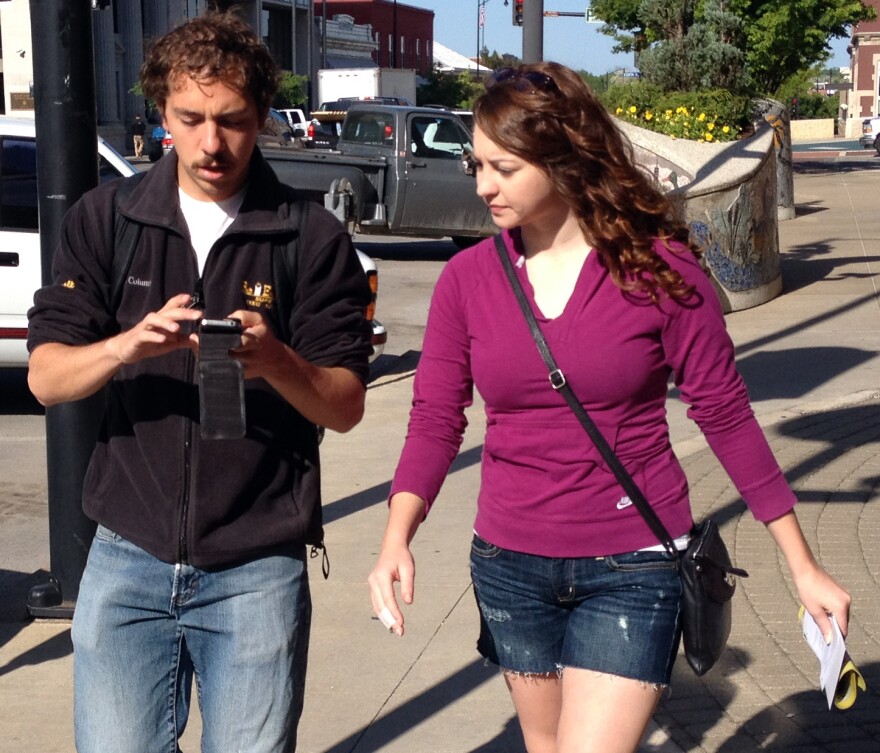This week, we'll take a look at games. We'll hear how one MU project is trying to engage young people through a futuristic competition. And stay tuned to the end of the show for a discussion of the science behind baseball.
In the year twenty-one seventeen, Earth is a much cleaner and more energy efficient place. And it all started because of the actions of MU students, as the tale goes in the 10-week game “REBOOT Mizzou.” KBIA’s Matt Veto has this report.
Each week, for the last 10 weeks, a group of MU students has been intercepting video transmissions — from the future. Ava, a future MU researcher, is shown speaking to a high-tech-looking computer that aids her quest with what she calls “The REBOOT.”
One hundred years ago or as we know it — somewhere between February 13 and today, which happens to coincide with the timeframe of the university’s “REBOOT Mizzou” project.
Steve Burdic, the MU sustainability coordinator, was searching for a way to engage students in Earth-friendly, practices — things like riding a bike, cleaning water sources, or learning about ways to reuse resources and limit waste. But he knew a lecture or presentation wasn’t going to work. By happenstance, he met Reynolds Journalism Institute Fellow Peter Meng.
“So, we started talking about different ways that that maybe he could get the message across, and I was telling him about some of the things I had done in the past with gaming and using games for teaching people how to do things.”
They applied for, and acquired, a close-to $25,000 grant from the MU Division of Information Technology. The grant’s purpose is to engage students through innovative uses of technology. They hired graduate student Hannah Sims to coordinate the project and organized around two-dozen more students to make it run.
REBOOT was born.
MU senior Max Smith is the captain of one of 27 teams that signed up for the 10-week game. With his iPhone in hand, he goes over his REBOOT plans for the day with teammate Amanda Vanslyke.
REBOOT works like a scavenger hunt. Students get a list of missions each week — some worth more points than others. Each team must have a smart phone and a special app that allows them to scan a QR code, which is a sort next generation of bar code. When they do, the application on the phone connects with the REBOOT scoring site and the team gets the awarded points. The team with the most points after 10 weeks wins 1,000 dollars.
Smith says he puts in about four to six hours a week organizing teammates and completing missions. He says he does it for the friendship and experience. While the money is a motivator, he says no one is pocketing the cash. If his team wins, they are going to use it to help fund a retreat for the Student Unions Ambassadors that make up his team.
Smith and Vanslyke make it to City Hall and take a short quiz based on a video they watched earlier. They get all of the answers right and the secretary at the front desk pulls out a QR code.
Smith and Vanslyke’s journey on this day takes them from City Hall, to a fire station, to a bus stop and to a grocery store that sells local food — and they did it all on foot. This adventure is tame compared to others they’ve had. Smith says one of the more interesting challenges was sifting through recycling containers, making sure the aluminum, glass and plastic items were in the proper cans.
These missions are voluntary, by the way. They sign up for them.
“The greater cause I think is awareness of sustainability. I really like what REBOOT’s message is — trying to save the future’s past," says Smith, "The things we do right now will have consequences that will end up making whatever our environment is in the future.”
That pretty much sums up the goal that Meng and the REBOOT organizers dreamed up when they created the project.
“One of the first things that we try to teach through these games is that little things make a difference. So, the smallest things that you do have an impact — have a long-term impact on our world as a whole, and that almost everything we do can have a positive effect without changing anything in our lifestyle—in fact, making our general lifestyle better.”
The winners of the program will be crowned on Sunday, which — not coincidentally — is also “Earth Day.”


